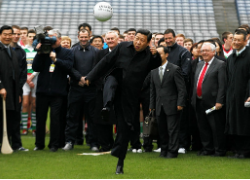
Xi JinPing is a likeable figure to the Chinese people: a fan of soccer and Hollywood war movies and married to a glamorous woman who is a famous Chinese folk singer. At ease with himself, the population is placing its confidence in this burley man with a deep, sonorous voice. Xi JinPing has some big shoes to fill. Not only is China a massive economic powerhouse, but also the Communist party is struggling with some heavy corruption. Dubbed the “fifth generation” of leadership, JinPing follows internationally known leaders that built a powerful country arguably more quickly than any other. Some analysts believe that China’s economic development model, which has delivered tremendous growth but at great environmental and social cost, is now unsustainable. As a result, JinPing must find a way to adapt a Leninist system of government to 21st-century economic problems and the political dynamics of the social media age.
Officially rising to the country’s top post as the chairman of the Politburo this Thursday, Beijing is preparing for a grand ceremony. The meeting to elect the new officials of the Chinese government, however, is not open to the public or available to media. Indeed, Internet searches have revealed new “censors” restricting searches with the party name included and any possible substituting words. On Thursday, some 2,268 delegates will elect 370 representatives to serve as the party’s central committee, who will in turn elect the two-dozen members of the Politburo. The Politburo then elects the seven- or nine-member Politburo Standing Committee who will become the epicenter of China’s power. All of this is completely hidden from the public eye.
China’s growth and the issue of US jobs being exported to China were hot topics during the recent presidential election in the United States. Now, with Xi JinPing as a rising political star in China, the United States will have to come to terms with a continuing economic battle. We, and the rest of the world, know what the United States struggles with because of media disclosure – the issues of our election were heavily discussed, from education and job growth to rebuilding our housing market. In stark contrast, we do not know the full extent of China’s struggles because the media is not allowed and is not privy to those discussions that may matter most to the public. In official deliberations, the issues are hidden behind ideological code phrases.
China’s challenges may hinge on the government’s lack of checks from the people and the media. Information is censored, government deliberations and decisions are not transparent, and many of the 1.3 billion inhabitants in China are oblivious of government policies and practices and why they exist. While the elections in the United States and China may occur contemporaneously, the processes and levels of disclosure are worlds apart.
Mimi Faller is a 2L at DU Law, and a Staff Editor for the Denver Journal of International Law and Policy.


